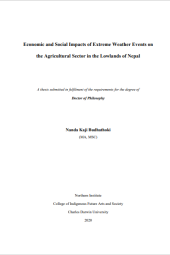Economic and Social Impacts of Extreme Weather Events on the Agricultural Sector in the Lowlands of Nepal
Summary
This thesis investigates the socio-economic impacts of climate change-induced extreme weather events (EWEs), specifically floods, heatwaves, and cold spells, on farming in the Terai lowlands of Nepal. Structured interviews with 350 randomly selected farmers in Bardiya and Banke districts were conducted to assess farmers' knowledge, risk perceptions, and adaptation strategies. The study reveals that the health and labor productivity of farmers are compromised during heatwaves and cold spells, with farmers perceiving cold spells as more threatening. Climate-related environmental risk is seen as the most severe agricultural risk, influencing farmers' coping and threat appraisals. The research emphasizes the importance of hazard-specific adaptation, highlighting crop insurance as a preferred strategy, but challenges like poor understanding and financial constraints hinder its uptake, suggesting the need for targeted and community-based education for effective climate change adaptation.
Categories:
Research Paper
Link Source:
DOI:10.25913/4sm1-m513
Publisher:
Nanda Kaji Budhathoki
Published Year:
2020
